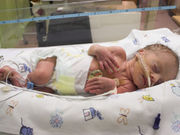However, children born preterm still have high risk for developmental delay
THURSDAY, Aug. 17, 2017 (HealthDay News) — During the past two decades, survival and survival without severe or moderate neuromotor or sensory disabilities have increased among preterm infants, according to a study published online Aug. 17 in The BMJ.
Véronique Pierrat, M.D., Ph.D., from the Epidemiology and Biostatistics Sorbonne Paris Cité Research Center, and colleagues evaluated neurodevelopmental outcomes at 2 years corrected age for 5,567 neonates born in 2011 at 22 to 34 completed weeks of gestation; 4,199 survivors at 2 years corrected age were included in follow-up.
The researchers found that survival at 2 years corrected age was 51.7, 93.1, and 98.6 percent, respectively, for liveborn neonates at 22 to 26, 27 to 31, and 32 to 34 weeks of gestation; one infant born at 22 to 23 weeks survived. The overall rate of cerebral palsy was 6.9, 4.3, and 1.0 percent for those born at 24 to 26, 27 to 31, and 32 to 34 weeks of gestation. The proportion of children with an Ages and Stages Questionnaire result below threshold was 50.2, 40.7, and 36.2 percent, respectively. Between 1997 and 2011 there was an increase in survival without severe or moderate neuromotor or sensory disabilities, from 45.5 to 62.3 percent at 25 to 26 weeks of gestation.
“In this large cohort of preterm infants, rates of survival and survival without severe or moderate neuromotor or sensory disabilities have increased during the past two decades, but these children remain at high risk of developmental delay,” the authors write.
Copyright © 2017 HealthDay. All rights reserved.








